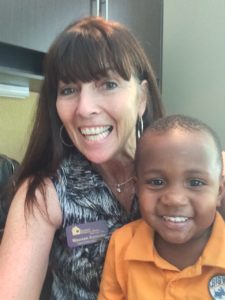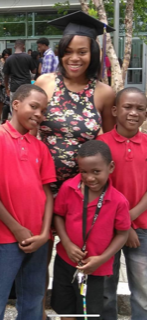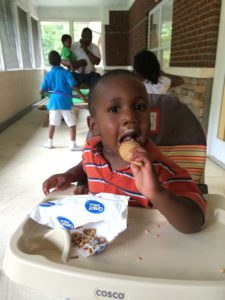Family discovers fresh start at Home of Hope
Eight years ago, if you told Kanesha Jackson about the life she has now, she might not have believed you.
“I never thought I would be here,” said this mom of four boys. “Especially not with this fiancée who my boys love. I would never have thought we would be where we are — thinking about buying a home, building this life. My oldest is working and he loves it. It’s amazing.”
Discovering home and hope
In 2014, when Kanesha and her boys came to Home of Hope, she’d already been through a lot.
Her parents married and divorced when she was young. She faced abuse as a small child, and she had two boys of her own before she turned 18.
“We’ve been through a lot,” Kanesha said. “And we still have some struggles, but it’s not like it was back then.”
Kanesha was also one of the first moms to enroll as part of the still-new Home of Hope program. (They shifted in 2013 from Gwinnett Children’s Shelter to the current Home of Hope program.)
Even though Kanesha didn’t officially complete the program, she’s quick to share how much it changed her family’s life.
 “I was a mess back then. I gave Miss Maureen and the staff a run for their money,” she recalled with a smile. “But my boys loved Miss Maureen. And even after we left, they did so much for us.”
“I was a mess back then. I gave Miss Maureen and the staff a run for their money,” she recalled with a smile. “But my boys loved Miss Maureen. And even after we left, they did so much for us.”
At Home of Hope, Kanesha and her boys received more than food and shelter.
“We had to learn how to budget, how to pay bills. I literally had to grow, raise my kids and help them grow,” she said. “Even after I left, I was still doing the budgeting and saving like I was there.”
Practical help like budgeting and saving made a difference, but so did the support that happens at Home of Hope.
“Some of the things they taught us, I still have that to go by in my head: I know I can do this. I know I’m not where I have been. I know this is only a temporary situation,” she explained. “I can better coach myself through situations now because of what they provided for me then.”
It’s an experience that also made a difference in her parenting.
“Now, I am parenting a lot different than how I grew up,” she added. “You get kind of stuck in parenting the way your parents raised you. I really feel like I learned a lot of different techniques. It gave me a lot of patience. I’m teaching them about budgeting, getting credit, a bank account — things I wasn’t taught as a kid. I’m able to instill these things into my children, and I’m able to see a big difference. I know they’re going to be better adults.”
Another game-changer for Kanesha and her boys?
“The biggest lesson was getting out of the City of Atlanta, going to Buford, getting away and just being able to take care of me. It was an amazing experience and I’m forever grateful,” she said.
Looking toward the future

While at Home of Hope, Kanesha started working toward her GED — an honor she’s since earned. She’s also in the process of becoming a small business owner. She plans to eventually become a licensed aesthetician.
“By the end of the year, I should have my business license as an LLC. So, that will be exciting to be a small business owner,” she added.
But they’re also taking time for fun.
“Now, we’re actually able to travel. That’s something I didn’t do at all as a kid,” Kanesha said. “We’re doing family trips, and I’m just enjoying being a mommy. Back then, it was just all about not having a job, and being a mom was stressful. But now, I can see the joys of it. And I can see my kids growing up happy.”

Finding that happiness wasn’t always easy. But Kanesha said, in some ways, those hard times help her be a stronger mom today.
“I believe my struggles from back then make me more aware and alert to [my kids’] needs. I refuse for them to ever feel unloved or unwanted,” she added. “I truly believe all four of my young men are blessings that came with the lessons I needed to learn to become the woman I am today.”
Having a family of cheerleaders in Buford made a difference, too, she said.
“Home of Hope is not as much an organization as they are a family. I know I can still call Miss Bridgette. I know I can still call and they’ll still welcome me with open arms,” she said. “They’re considered family. Even though it’s been years since I’ve seen them, I can still call.”